Urology TREATMENTS
Urology
The urological component has as its main function, the excretion of waste materials produced by the kidneys and liver. Without it, our body could not finish eliminating toxic substances or those that are in excess. Urological problems are more common than is believed and can seriously affect the integrity and health of other organs and systems, such as the genital. In our Andromedi clinics in Madrid, Seville and the Canary Islands, specialist urology professionals are trained to offer the best service in a wide variety of situations.
Urology
Table of content
Prostate
Prostate problems
The prostate is a very small male organ, similar to a walnut, that fulfills essential functions in reproduction and that, over the years, can cause problems if its vigilance is neglected.
Benign prostatic hyperplasia (BPH)
It is the most important condition of this gland and is characterized by an overgrowth that can, among other things, cause urinary obstruction and pain.
BPH occurs when serum testosterone levels decline after 40 or 50 years of age and the cells of the gland are enlarged by an exaggerated multiplication of receptors to this hormone.
Prostatitis
Prostatitis are a large group of prostate inflammations with etiologies other than testosterone sensitivity (BPH) or tumors (prostate cancer).
Prostatitis can be due to infectious causes such as caused by bacteria or trauma. They are usually painful and also compress the urethra and put the gland at risk.
Prostate cancer
Prostate cancer or prostate carcinoma is the type of male malignancy with the highest prevalence in the population.
Tumors of this gland tend to grow very slowly and involve the entire body if widespread spread (metastasis) occurs.
Recommendations
Among the suggestions of our Andromedi centres in Madrid, Seville and the Canary Islands to prevent and treat prostate diseases in time is early detection.
Any alteration in urinary function such as pain, difficulty or presence of blood or pus can indicate problems in the gland that must be treated immediately.
In addition to waiting for this, periodic check-up with a urologist is important. Almost all cases of BPH and cancer usually have a good prognosis if they are diagnosed early.
Looking for prices and information?
Use our virtual assistant and receive in your email everything related to the treatments that interest you. Budgets, recovery times, hospitalization, financing possibilities month by month, etc.
In just a few minutes and without any commitment.
En cumplimiento del Reglamento General de Protección de Datos le informamos que los datos por Vd. proporcionados serán objeto de tratamiento por parte de Andromedi con la finalidad de prestarle el servicio solicitado y/o contratado. Los datos no se cederán a terceros salvo en los casos en que exista una obligación legal. Para más información puede consultarla pinchando aquí.
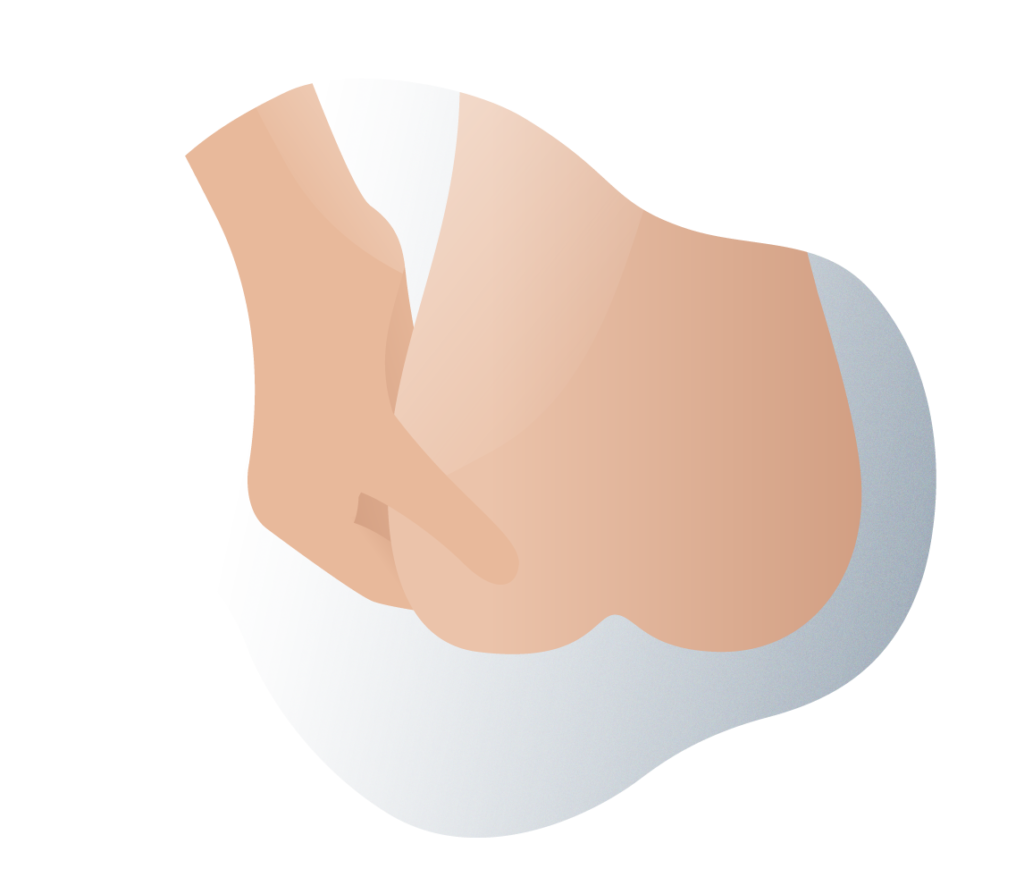
Testicular cancer test
Serious problems
Cancer and tumors
Urological cancers and tumors have a high incidence, especially in men who have not undergone screening evaluations such as digital rectal examination (DRE), the method par excellence for examining the prostate gland.

Testicular cancer test
Besides prostate cancer, what others?
The main malignant tumors in men are those of the prostate, followed by:
Testicular cancer is the second most common type of cancer associated with the male sex and has many implications for men's health, especially in the reproductive and secretory function.
Remember that the testes are the organs responsible for the production of sperm (seminiferous tubules) and the synthesis of testosterone (Leydig cells).
The penis can also be the target of malignant neoplasms, specifically, the corpora cavernosa of the member,
Penile cancer is much less frequent than the previous ones, but it has also shown an alarming increase in its prevalence in recent years.
Treatment of urological cancers
The clinical management of these diseases is multidisciplinary, that is, the patient must be cared for not only by oncologists, but also by urologists, andrologists, sexologists and psychologists given the great impact it has on the lives of those who suffer from them.
Liquid accumulation
Hydrocele
Although more common in children, it can occur in adults and, like the previous one, should be treated immediately.
Why is it produced?
Hydrocele is the accumulation of fluid in the testicular bags, causing severe pain.
This can occur for many reasons, but in adults, the most frequent are trauma or blows to the scrotum, the use of very tight abdominal girdles, infections and some surgeries.
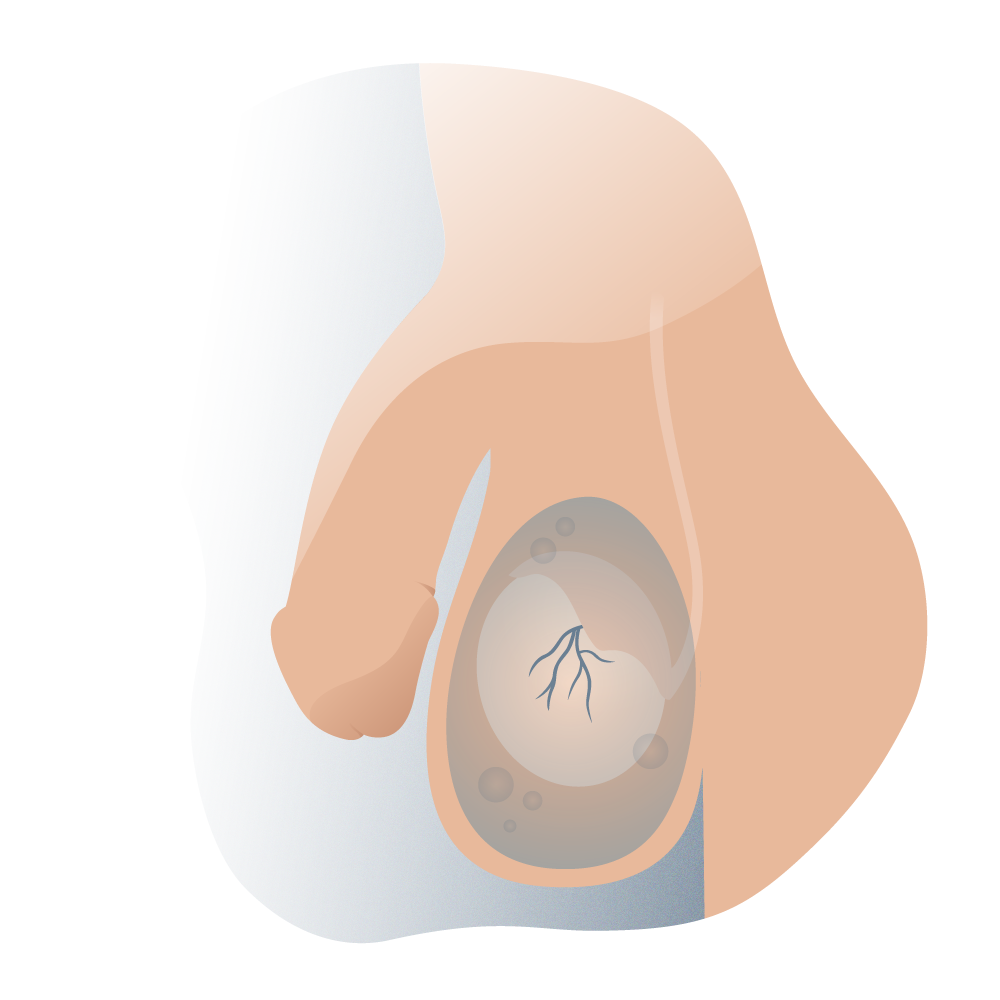
Testicle with hydrocele
What is the treatment?
Often times, the hydrocele can go away on its own within a few days (this requires close medical monitoring) but if this does not happen, the solution is surgery to drain the fluid and decompress the testicles.

Other types of problems
Male hypogonadism
Given the importance of testosterone, this pathology of the endocrine system can have many implications for men’s health.

What is it and types of the disease?
Male hypogonadism is defined as deficient testosterone production in the testes due to alterations in the hypothalamic pituitary axis (primary hypogonadism) or in the Leydig cells of the testicle (secondary hypogonadism).
How is it treated?
Hypogonadism is treated with a therapy called TRHT in which exogenous testosterone is administered to make up for its deficiency. This is done intramuscularly from time to time. Medical follow-up and blood tests are essential to assess the progress and remission of the disease.
Liquid accumulation
Urinary incontinence
Urinary incontinence is unbelievably common, and also looked down upon. The social stigmas and the shame of those who suffer from it mean that in many cases, the problem worsens over the years without an effective solution.
When and why does it happen?
Urinary incontinence is a problem related to advanced ages but it can occur much earlier due to various causes, especially due to neurological factors (such as diabetic neuropathy in which the nerves that go to the bladder are damaged) or muscular factors, in which the The organ’s sphincters lose their tone and therefore the ability to hold urine.
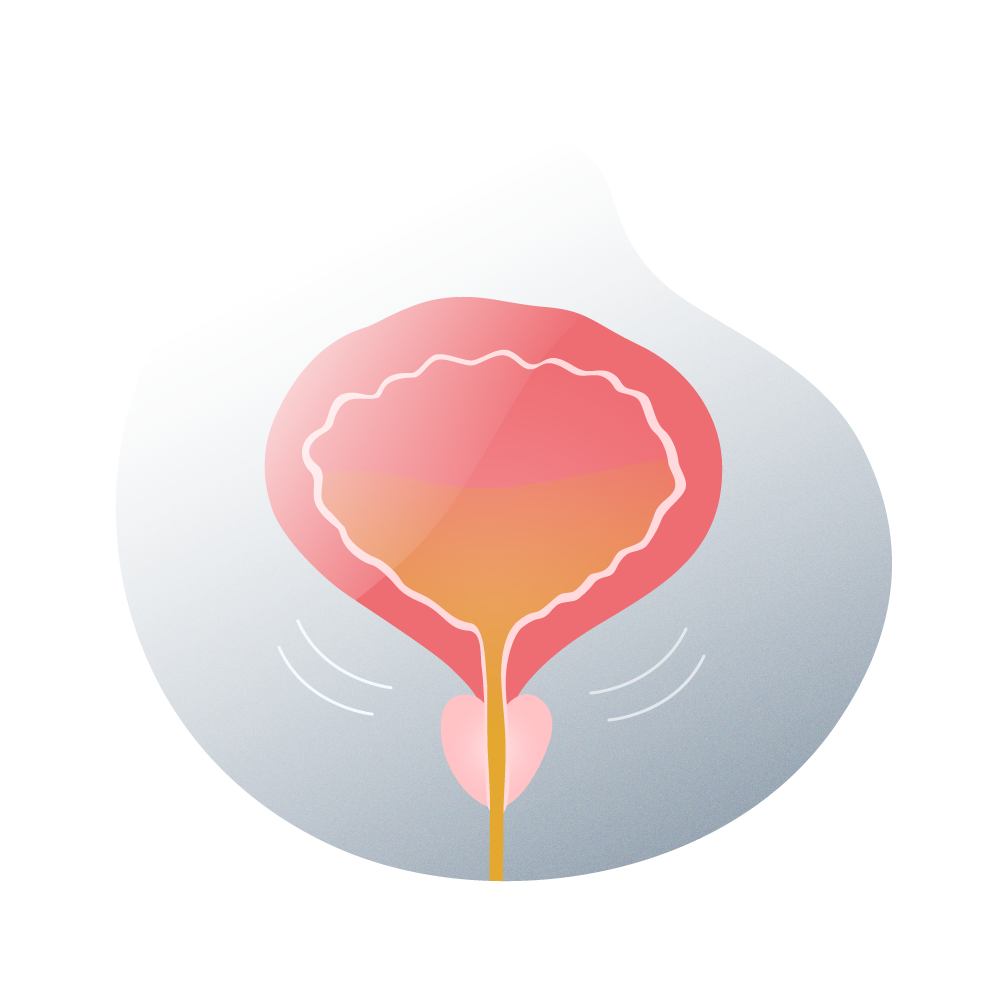
Type of urinary incontinence
Urinary incontinence treatments
Almost all the treatments for this condition are surgical, such as the implantation of a bladder mesh.
This mesh, made of a synthetic material, can greatly help the bladder to drain urine only when the patient allows it in urination.
Infection
Urinary infections
Urinary tract infections are the most common non-neoplastic pathology in urology and require appropriate treatment to avoid complications.
Treatment of urinary infections
Before proceeding with antibiotic treatment, it is important to determine the causative agent of the infection.
They are often bacteria like Escherichia coli, but these infections could also be caused by fungi or parasites.
After knowing the pathogen of the infection through laboratory analysis and urine cultures, the doctor can prescribe the necessary antibiotic therapy, which must be followed to the letter.
What happens if I don’t treat a urinary infection?
Untreated (or poorly treated) urinary infections are often complicated, especially in patients with diabetes or other underlying diseases.
These complications can range from invasion of the kidneys (pyelonephritis or glomerulonephritis) to more severe infections such as meningitis or septicemia.
Estenosis
Urethral pathology and stricture of the urethra
The urethra is the tube that carries urine from the bladder to the tip of the penis, where it exits and, although it is a short route, obstructions in this path can lead to more serious complications.
Why is a urethra blocked?
The opening of this segment of the urinary tract can be closed for several reasons, but the most common are infections that induce inflammatory processes.
Kidney stones (renal lithiasis) can also move from the kidneys to the lower urinary tract.
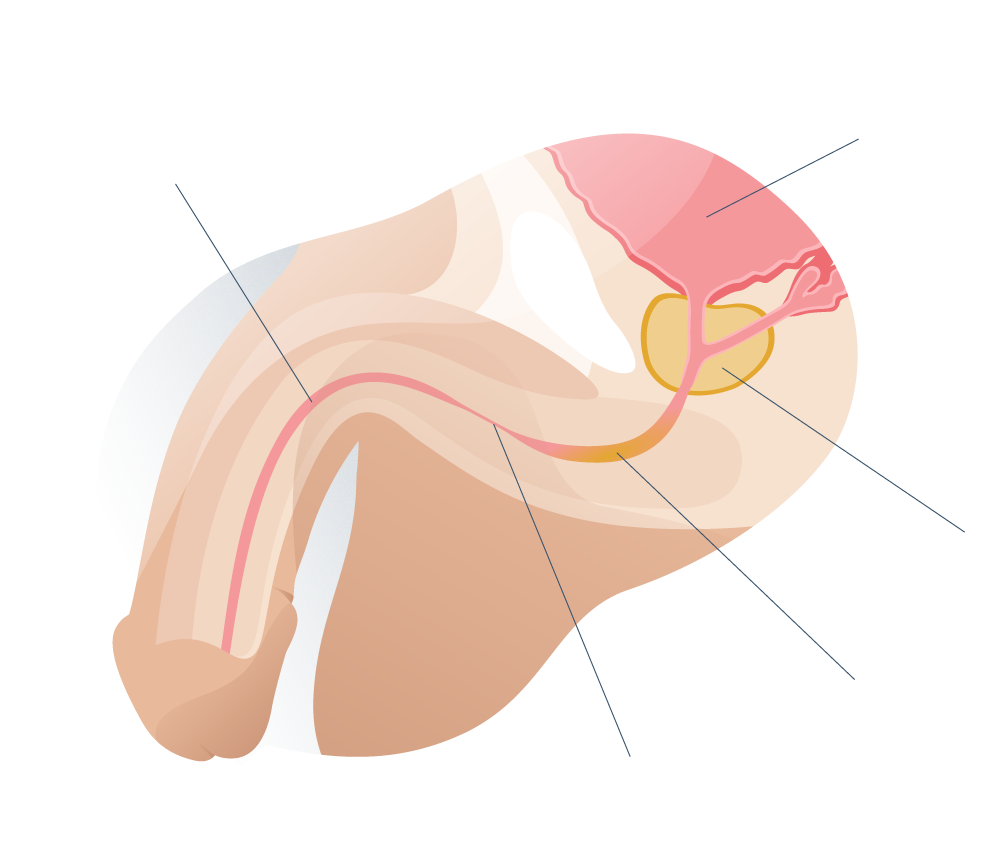
Urethral stricture
Dangers of a urethral obstruction
A urinary obstruction to any route, but especially this one, can cause intense pain and produce an excessive increase in the pressure that urine exerts on the walls of the bladder and kidneys.
The latter can damage the delicate filtering tissues in the kidney nephrons and have serious long-term consequences. Therefore, it is important to go to the doctor once obstructive symptoms such as pain, a feeling of heaviness and inability to urinate are noticed.
Skin lesions
Genital moles, spots and warts
These skin lesions can go unnoticed and many patients even notice them, but in many cases, they can become so large and unsightly that they must be removed.
They are normal but require medical evaluation
Moles and even more, spots and warts are not so pleasant to look at but they do not always have to represent a problem for the patient. However, as these are areas of such delicate skin, it is ideal to consult a doctor to check them and make sure that everything is fine.
Elimination of genital lesions
These skin lesions can be removed by several simple ways such as surgical removal with forceps (a completely painless procedure) or by laser.
"In our centres in Madrid, Seville or the Canary Islands (Tenerife), we carry out the techniques and treatments with the most modern facilities and the best specialists and equipment to guarantee an effective solution".
For prostate problems
Da Vinci® Robot
Robotic surgery with the Da Vinci® system is an innovative method and the safest, newest and most precise way to operate on the prostate gland in the event of excessive enlargement due to cancer.
It is a minimally invasive procedure with excellent postoperative results and many benefits for the patient.
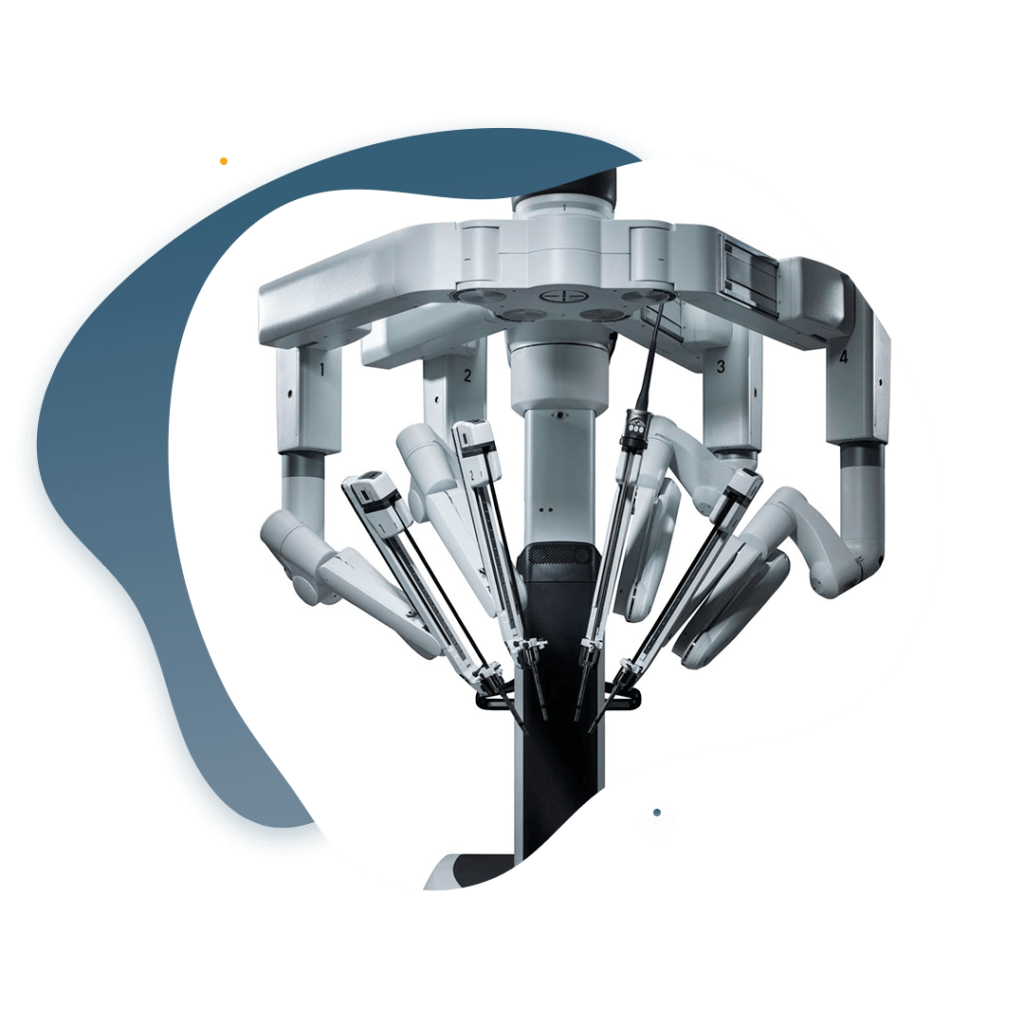
Da Vinci® robot
What is the Da Vinci® Robor technique?
Behind the Da Vinci® robot there are many years of scientific research and technological and human refinement to enable this marvel of modern surgery.
Its extremely high accuracy in locating and removing the cancerous prostate tissue while taking care of the surrounding structures, makes it the ideal minimally invasive surgical method to treat this pathology.
Why Da Vinci® robotic surgery?
The benefits of robotic surgery in benign prostatic hyperplasia are derived from two special features:
- Maximum precision
- Minimal aggressiveness
Does it have other surgical applications?
Although it is an amazing and novel system, it is only available for prostatectomies and pyeloplasties.
It will soon be possible to perform many other surgical procedures. It is an area in full development and is projected to be the future of urological surgery.
The areas of application most in demand are as follows:
- Bladder cancer.
- Prostate cancer.
- Kidney cancer.
- Pelvic organ prolapse.
- Entrapment of the pudendal nerve.
Author
Natalio Cruz MD, with 25 years of medical experience, has been until 2016 Head of the Andrology Unit in the Urology Service of the Virgen del Rocío Hospital in Seville, National Coordinator of Andrology in the Spanish Association of Urology (AEU) and General Secretary in the ESSM, positions that he has narrowed to focus squarely on this exciting project of offering a high-level private medical consultation in Marbella, Seville, Madrid and Tenerife.
Andromedi pertenece a las organizciones médicas más destacadas en el sector de la Uro-Andrología